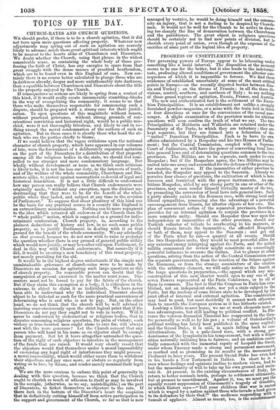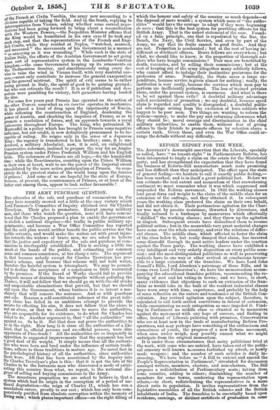PROGRESS OF UNSETTLEMENT TR EUROPE.
THE governing powers of Europe appear to be labouring under something like a lucid interval. The disposition at the moment seems to be one for the better, but it also tends to the indetermi- nate, producing altered conditions of government the ulterior eon.. sequences of which it is impossible to foresee. We find these evidences of established uncertainty at some of the most critical points in Europe—on the recently disputed border between Rus- sia and Turkey ; on the throne of Prussia ; in all the three di- visions, central, southern, and, northern of Italy ; to say nothing of those grand regions of agitation, Russia, France, and Austria The new and authenticated fact is the settlement of the Dann: bian.Prineipalities. It is an establishment not unlike a strongly furnished powder-magazine, or a mine with the train laid in three or four directions at once for the convenience of the casual pas- senger. A slight examination of the provision made for ulterior questions will soon confirm the truth of what we say. The two Principalities of Moldavia and Wallachia are retained under the Suzerainty of the Porte, to which they are tributary ; they are kept separate, but they are formed into a federation of the " united. " Danubian Principalities. Each is to have its own affairs administered by a Hospodar and his two Houses of Parlia- ment; but the Central Commission, coupled with a Supreme Court of Judicature, will have the power of converting local laws into general laws and of determining questions common to the two provinces. The Militias are to be separate, each under its own Hospodar ; but if the Hospodars agree, the two Militias may be united into one army and assembled for the defence of the provinces, for exercise, or review. If the immunities of either province be invaded, the Hospodar may appeal to the Suzerain. Already we perceive four classes of questions, the cultivation of which is here foreseen and furnished with the proper instruments. An am- bitious Hospodar, aided by any strong party in one or other of the provinces, may soon render himself virtually master of the two, by promoting the conversion of local laws into general laws. Such a party already exists in the Roumau race, with strong local and liberal sympathies, possessing also the advantage of a powerful encouragement from Russia, for ulterior objects of her own. The plan of concurrent action of the separated provinces, therefore, provides for an internal agitation to conjoin the provinces in a more complete unity. Should one Hospodar thus war upon the independence or immunities of the other province, should any Turkish collector of tribute be overbearing in his manners, or should Russia invade the immunities, the offended Hospodar, or both of them, may appeal to the Suzerain ; and get out of the Porte what he can—a quarrel at all events. Should the two Hospodari unite, they would be most powerful allies for any external enemy intriguing against the Porte, and the united
Ttia summoned for review might constitute an exceedingly powerful influence to overawe the Sultan. Not to glance at other questions, arising from the action of the Central Commission over the separate governments, from the reaction of the Sclave against the Roumans, or from the strange commixture of the elective with the arbitrary element, we will only notice as the fourth of the large questions in preparation,—the appeal which any mis- construction of this new charter would open to any one of the seven Powers represented at the Paris Conference, or to all of them in common. The fact is that the Congress in Paris has esta- blished, not an independent state, nor yet a state subject to the Porte, but the nucleus of some future state to be developed by the joint effect of internal and external agitation. The combination may lead to good, but most decidedly it cannot work otherwise than to unsettle the European system as it has hitherto existed.
Looking a little nearer home, we see at work elements more or less advantageous, but still leading to political conflict. In Flo- rence the veteran dramatist Niceolini has reappeared in the th. e&- tre personally as well as by his pen ; a volume of Gine,ciard.ini's political writing has lately been published in the same capital ; and the Grand Duke, it is said, is again falling back to eon- stitutionnlicm. He is a pale-faced man, with a strong pre- dominance of the lymphatic in his temperament, but with a dispo- sition naturally inclining him to fairness, and an ambition essen- tially connected with the immortal repute of Leopold the Great, under whom Tuscany made a strong and permanent movement, as marked and as promising in its results as the movement of Piedmont in later years. The present Grand Duke has even, had in his hands a New Testament in Italian. In short he is a man whose feelings and opinions incline to modern views, hail he but the muscularity of will to take up his own ground and main- tain it. At present, in the existing circumstances of Ital. y, o return to better counsels tends, perhaps to settlement ultimately, but at present to unsettlement. Against it, too, we must put, equally recent suppression of Giaccometti's tragedy of G. tudata2 in which Ristori says—" Tell your children that war is sacred. which is waged by a nation against those who invade a.londgiven to its defenders by their God !" the audience responding with s tumult of applause. Almost as recent, too, is the reinforcement of the French at Civita Vecchia, the army now amounting to a dicision capable of taking the field. And in the South, replying to interrogatories from Vienna, asking whether some correct nego- tiations had been going forward to bring about a reconciliation with the Western Powers,—the Neapolitan Minister affirms that the King would be humiliated in his own eyes if he took any
eh stab and that the representatives of the French and Eng- gu
lish Courts, while they resided at Naples, "watched, scanned, and measured" the movements of his Government in a manner if as annoying as it was wounding." While such is the state of Italian Italy, the efforts of the Austrian Government to set going some sort of representative system in the Lombardo-Venetian idagaoca —the same Government keeping up its armaments on the Piedmontese frontier, and simultaneously using every de- vice to raise the wind in Vienna itself, with very doubtful sue- 5'—must only contribute to increase the general exasperation and the general mistrust. The spirit of evil seems to be rather lasing ground in Italy, the spirit of good to be gaining ground ; but who can estimate the result ? It is as if patriotism and des- potism were gambling for victory, both gamesters having loaded the dice. For some few years past Prussia has operated on the action of the other Powers somewhat as vie inertia operates in mechanics. It has placed a kind of drag upon the impetuosity of Russia, while softening the counteraction of England, deadening the power of Austria, and checking the impulses of France' so as to promote a resolution of forces, and an approach towards a royal quiescence throughout Europe. The King, who patronized M. Manteuffel in a policy which has brought to Prussia some negative influence but not credit, is now definitively pronounced to be in- capable of ruling. He reigns only in the sense of a Japanese King ; the regency is transferred to his brother ; once, it is un- derstood, a military Absolutist, now, it is said, an enlightened Conservative reformer, inclined to prepare the way for an Anglo- Prussian system under Prince Frederick William and his English bride. The reformers of Prussia are all hope,—for the hundredth time: while the Reactionaries, counting upon the Prince William as their own at heart, wait to see the power of the Imperial sword consolidated by the more active participation of Prussia. So com- pletely do the greatest states of the world hang upon the fancies of princes ! And some of us are hopeful for the state of Europe, because' at present, the countenances of Princes, or at least of the better sort among them, appear to look rather favourable !



































 Previous page
Previous page